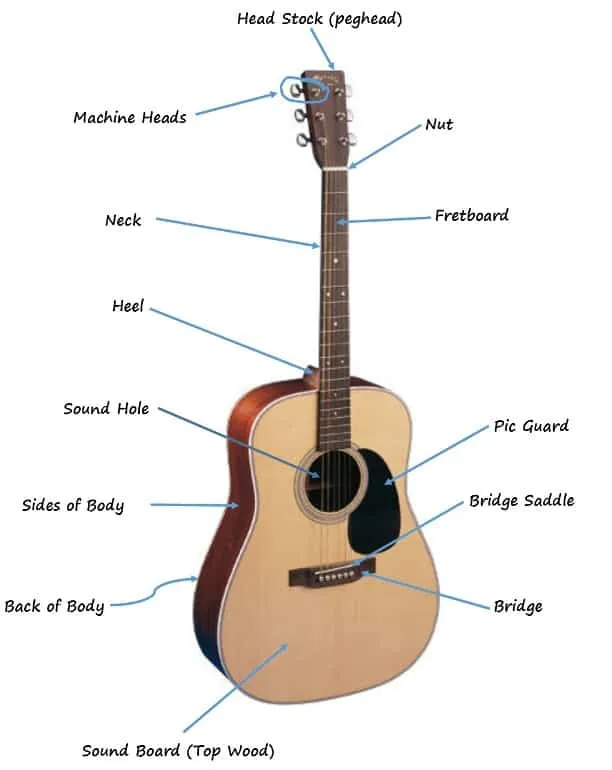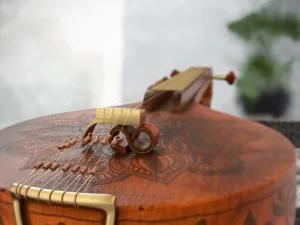A pentatonic scale is a musical instrument, which contains five notes or pitches per octave. Pentatonic word is derived from the Greek words “Pente” which means “five” and “tonic” which means “tone”. Pentatonic scales are the most simplified version of all other scales.
When we use the Pentatonic scale properly, it will produce a consonant line. However, when we overuse the Pentatonic scale it can be boring. The most commonly used versions of Pentatonic scales in the guitar are C major and A-minor Pentatonic scales.
In simple terms, we can say that Black coloured keys on the piano are known as the Pentatonic scale.

History
Pentatonic scales are probably the oldest known scales on the earth. These scales were independently developed by numerous ancient civilizations. Though Pentatonic scales are commonly utilized in modern music, these scales are believed to date back to ancient Greek time.
Early Gregorian chants contained Pentatonic scales in various structures. These scales are found in Native American, African, and South Asian traditional music. Archaeologists dug up ancient flutes made out of bird bones with a lot of them tuned to the Pentatonic scale.
Difference between a major scale and Pentatonic scales
The major scale is also known as the diatonic scale, which is used as a standard reference scale to define theory about intervals and they are used in scales, chords, progressions, etc.
The main difference between the major scale and Pentatonic scales is that the Major scale contains seven notes per octave but the Pentatonic scale contains five notes or pitches per octave. In Diatonic or Major scale, out of 7 notes, five tones are whole tones(whole steps), and the remaining two are semitones(half steps) and these two half steps are separated by either 2 or 3 whole steps depending on their position on the scale, but all 5 tones of a Pentatonic scale are whole steps.
Types of Pentatonic scales
There are different types of Pentatonic scales. But only two types of Pentatonic scales are popular. They are Major Pentatonic scales and Minor Pentatonic scales
Major Pentatonic scales
The Major Pentatonic scales do not contain semitones or half steps because these scales are known as Anhemitonic scales. Major Pentatonic scales are believed to be incomplete Major scale. Major Diatonic scale or natural Major scale contains C-D-E-F-G-A-B degrees or notes but when we omit or remove fourth and seventh-degree from major scale it becomes major Pentatonic scale.
The 4th degree is “F” and the 7th scale degree is “B”. Therefore the formulae of the Major Pentatonic scale is C-D-E-G-A (5 tones or degrees). The Major Pentatonic scales are less familiar than minor Pentatonic scales to most guitarists but it is equally important and useful. You hear this sound all the time in just about every style of music like rock, jazz, blues, country music. The main Solfa syllables of a Major Pentatonic scale are Do-Re-Mi-Sol-La.
Minor Pentatonic scales
Minor Pentatonic scales are also Anhemitonic scales and incomplete minor diatonic scales. The Minor diatonic scale has A-B-C-D-E-F-G-A scale degrees in order. When we omit or remove 2nd and 6th degrees from the natural minor scale or minor diatonic scale, it becomes a Minor Pentatonic scale. Therefore the minor Pentatonic scale has A-C-D-E-G degrees in order. The 2nd degree is “B” and the 6th degree is “F”. A minor Pentatonic scale has the same notes as the “C” major Pentatonic scale but starts from a different place.
Why these scales are most preferred?
- Most simplified scale: It is the most simplified scale of all other scales. It contains only five notes or a five-degree scale which can be easily memorable and playable.
- versatility in spontaneity: We can use Pentatonic scales over a wide range of instruments like guitar, piano, flutes, or when singing they provide you with a universal power to move people musically. They sound good in almost all types of music like major and minor chord progressions and also in 12 bar blues progressions.
- Easy to play: It is one of the easiest scales to play and often will sound good with notes played in any order as these scales do not contain semitones or half-step intervals them which can cause dissonance.
- Play over modes: All Pentatonic scales contain scale degrees C-D-E-G-A only but start at different points. We can alternate a major Pentatonic scale to a minor Pentatonic scale and a minor Pentatonic scale to a Major Pentatonic scale easily. The major modes like Ionian, Lydian, and Mixolydian can be played by using a major Pentatonic scale only.
Uses of pentatonic scales
- Pentatonic scales can be utilized in all types of music. indeed, even complex music like jazz, pop, and rock additionally utilizes Pentatonic scales.
- Major Pentatonic scales are used extensively in country music.
- In blues, minor pentatonic scales are the premise of both deep vocal tunes and sad guitar performances.
- In weighty metal, minor Pentatonic scales play a key role to produce melodious music.
- We can recognize the Pentatonic scale easily by simply listening to the music because it contains only 5 notes but all other musical scales have more notes.
Learn to practise Pentatonic scales
Undoubtedly the Pentatonic scales are basic and significant devices for learning and improving the performance of instruments. To get familiar with the scales, one should comprehend the ideas of melodic scale intervals, modes, cheat sheets, and so on. One should learn the difference between major and minor Pentatonic scales. Memorize the different positions of Pentatonic scales along the fretboard. Try to improvise or gain proficiency in each position and afterwards attempt from position to position, step by step working your way across the entire fingerboard.
It takes some time, be persistent, and study the whole scale until you learn. Continuously recall that it is significant that when you play a note it doesn’t make unusual noises or sounds awful. if this happens please slow down it until all the notes sound great. Don’t fear a little dissonance. Practice the notes until you mastered the music.
The person who plays slower; however obviously without any errors is consistently a better entertainer than the person who plays quickly without comprehending or with numerous mistakes. Try to rectify your mistakes and concentrate on that area to rectify those mistakes. Be confident and try to perform the same notes in new ways. When you feel you mastered the minor pentatonic scale it is better to practice with the Major Pentatonic scale because both the scales contain the same notes but start from different points.
Share with your friends





